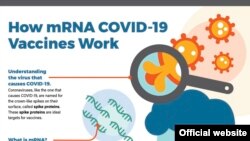On June 21, the U.K.’s GB News tweeted a video of two of its program hosts, Kirsty Gallacher and Darren McCaffrey, discussing how vaccinating against COVID-19 could help ease pandemic restrictions. They expressed hope that “double-jabbed” people would be able to travel and enjoy summer vacations free of masks, social distancing and airline restrictions.
A U.K. politician, David Kurten, leader of the Heritage Party, retweeted the GB News video along with comments condemning vaccinations.
“There should be no coercion to take an injection of experimental gene modification technology by implementing travel apartheid,” Kurten tweeted.
Nearly a thousand Twitter users liked or retweeted Kurten’s post, and of about a hundred users who commented on it, four called it false while others agreed with it. Some users added memes claiming the COVID-19 pandemic was a government conspiracy, while others posted links to websites notorious for spreading disinformation, such as the U.S.-based Infowars.com.
Kurten’s tweet is misleading. Most scientists categorically deny that vaccinations modify human DNA, the hereditary material which makes up our genetic code, or genome.
Based on results of large critical trials, U.K. health authorities have granted temporary authorizations for four COVID-19 vaccines: Moderna, Oxford-AstraZeneca, Pfizer-BioNTech and Janssen.
Three of them – Moderna, Oxford/AstraZeneca, and Pfizer/BioNTech – use what’s called messenger RNA (mRNA) to create immunity against the virus that causes COVID-19.
mRNA vaccines are based on a well-developed technology that until now had only been approved for human trials for treatment of certain viral-related diseases, including certain types of cancer and HIV, among others. Overall, some 2.7 billion COVID-19 vaccine doses have been administered worldwide, including the mRNA vaccines.
Essentially, the mRNA vaccines carry instructions to parts of cells that create protein to help recognize and against COVID-19. In the process, the mRNA is destroyed, which means the recipient’s genes are not modified.
The U.S. Centers for Disease Control explains it in more detail:
“COVID-19 mRNA vaccines give instructions for our cells to make a harmless piece of what is called the 'spike protein.' The spike protein is found on the surface of the virus that causes COVID-19.
“First, COVID-19 mRNA vaccines are given in the upper arm muscle. Once the instructions (mRNA) are inside the immune cells, the cells use them to make the protein piece. After the protein piece is made, the cell breaks down the instructions and gets rid of them.
“Next, the cell displays the protein piece on its surface. Our immune systems recognize that the protein doesn’t belong there and begin building an immune response and making antibodies, like what happens in natural infection against COVID-19.
“At the end of the process, our bodies have learned how to protect against future infection. The benefit of mRNA vaccines, like all vaccines, is those vaccinated gain this protection without ever having to risk the serious consequences of getting sick with COVID-19.”
What about the recipient’s DNA? The CDC explains:
“COVID-19 mRNA vaccines do not affect or interact with our DNA in any way. mRNA never enters the nucleus of the cell, which is where our DNA (genetic material) is kept.
The cell breaks down and gets rid of the mRNA soon after it is finished using the instructions.”
Kurten’s mashup of “gene modification” and “experimental” is the kind of conflation that helps sustain vaccine hesitancy or outright rejection of vaccines. Public surveys show that vaccine hesitancy is a global issue and a major obstacle to curbing the pandemic.
“What’s driving skepticism: Concern about side effects and the speed at which the vaccines went through clinical trials,” the Morning Consult global survey concluded on June 17.
There are reported side effects among the vaccinated, but they are rare and the majority are minor. Public health authorities overwhelmingly say the benefits of vaccination outweigh the risk of side effects, and that long-term side effects are unlikely.
Studies show that the vaccines are saving lives.
“These real-world data confirm that COVID-19 vaccines are protecting the vast majority of people from serious disease and death, especially after two doses,” Jonathan Ball, a professor of molecular virology at Britain’s University of Nottingham, was quoted as saying. “This is an incredible outcome as it paves a way out of this, and future, lockdowns.”
Ball was reacting in part to studies reported in May by Public Health England, which found an 80 percent lower risk of death for people receiving a single dose of the AstraZeneca vaccine and a 97 percent lower risk of death after two doses of the Pfizer-BioNTech vaccine.
Additional mRNA vaccines for COVID-19 are in the works. The technology is considered transformational, as it dramatically speeds up the time needed to create a safe, effective vaccine. According to the Memorial Sloan Kettering Cancer Center:
"The advantage of mRNA technology compared with conventional approaches is that it allows for faster development and scale-up of production. Vaccine development has traditionally been measured on the timeframe of a decade. It’s an amazing scientific accomplishment to be where we are right now. A year ago, most people had not even heard of this disease, and now healthcare workers are starting to receive a vaccine for it."





